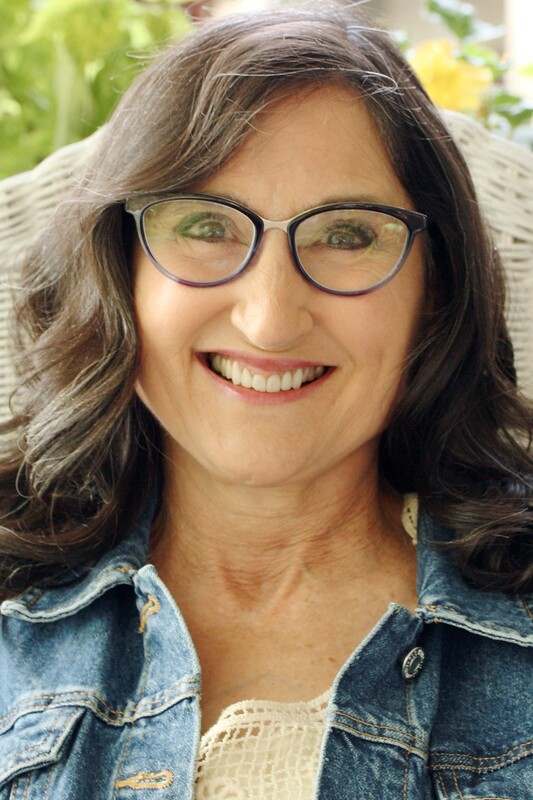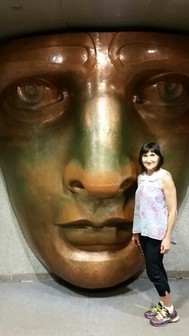 Replica of Liberty's Face Replica of Liberty's Face "Give me your tired, your poor, Your huddled masses yearning to breathe free," My visit to the Statue of Liberty earlier this week inspired me to learn more about the woman who wrote those famous words. They really struck me, almost to tears when I first heard them as a child. I marvel at them again now, and at the power of poetry to move people’s emotions and stir them to action. Where does such power come from? The author of the words, Emma Lazarus was born in New York in 1849 to a wealthy Jewish family. Her ancestors were Sephardic Jews who fled the Spanish Inquisition for Colonial America. Emma was a curious, bright girl who loved reading, and started writing poetry at a young age. Living in 19th Century America, she had at least two strikes against her. She was a woman, and she was Jewish. However, her father fully supported her writing, and self-published her first volume Poems and Translations: Written Between the Ages of Fourteen and Sixteen. 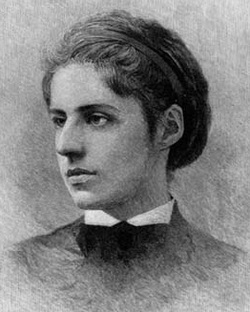 T. Johnson - The New York Historical Society T. Johnson - The New York Historical Society At some point her poetry impressed Ralph Waldo Emerson and they began a long-term correspondence. In 1883, during the drive to raise money to build the pedestal for the Statue of Liberty, Emma wrote “The New Colossus”. She’d been hearing news of the vicious anti-semitic pogroms in Russia, and as Jewish refugees streamed into the U.S. from Eastern Europe, Emma was shocked. Poor, sick, and uneducated, they were nothing like her upper class New York social circle. Many well-established Jewish Americans feared these immigrants would reflect badly on them and didn’t want anything to do with the newcomers. But Emma take a break from writing to help the Russian Jewish immigrants, giving of her own money and helping raise funds to feed and clothe them. She set up job training in the industrial trades, which grew into the Hebrew Technical Institute. And, she wrote poems and essays about their plight. "Until we are all free, we are none of us free," she said. 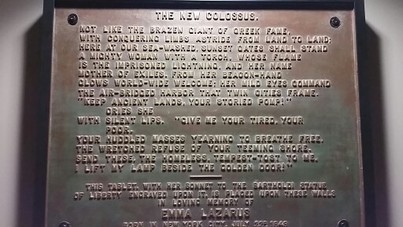 Throughout the 1870s and early 1880s, many of Emma's poems appeared in American magazines and newspapers, including the New York Times. Her poetic dramatization of Richard Reinhard's 1877 Der Tanz zum Tode, celebrated the courage and faith of 600 Jews who were killed, many burned to death, in Nordhausen, Germany, in 1349. The massacre was one of hundreds throughout Europe during the plague, where Jews were accused of causing the Black Death. Emma’s writings also spoke to the importance of literature to culture and the needs and rights of the artist. But none of her work became as well-known as the poem which is engraved in bronze at the Statue of Liberty. Once posted at the foot of the statue, it has since been moved inside for protection against the elements. The New Colossus by Emma Lazarus 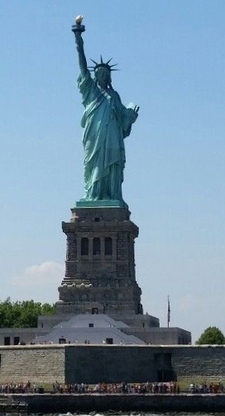 Not like the brazen giant of Greek fame, With conquering limbs astride from land to land, Here at our sea-washed, sunset gates shall stand A mighty woman with a torch, whose flame Is the imprisoned lightening, and her name Mother of Exiles. From her beacon-hand Gloves world-wide welcome; her mild eyes command The air-bridged harbor that twin-cities frame. "Keep, ancient lands, your storied pomp!" Cries she With silent lips. "Give me your tired, your poor, Your huddled masses yearning to breathe free, The wretched refuse of your teeming shore, Send these, the homeless, tempest-tossed to me: I lift my lamp beside the golden door. Emma's poem gives me the shivers! It's message was never more important than it is today. Does it have any special significance for you? If so, I'd love to hear your story. Comments are closed.
|
I'm fascinated to discover little-known history, stories of people and events that provide a new perspective on why and how things happened, new voices that haven't been heard, insight into how the past brought us here today, and how it might guide us to a better future.
I also post here about my books and feature other authors and their books on compelling and important historical topics. Occasionally, I share what makes me happy, pictures of my garden, recipes I've made, events I've attended, people I've met. I'm always happy to hear from readers in the blog comments, by email or social media. Archives
September 2023
Categories
All
|
